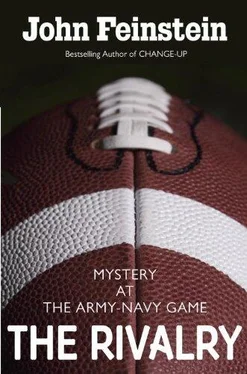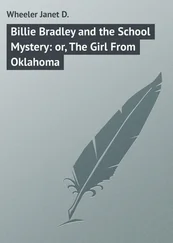Dowling nodded. “There are some things I can’t tell you, Steve, but I’ll fill you in on what we do to prepare for something like this.”
“So it’s a big deal?” Stevie asked.
“Any time the president travels, it’s a big deal,” Dowling said. “When he’s traveling to a stadium with ninety thousand people inside, it’s way beyond a big deal.”
“So what’d you talk to the supe about?” Cantelupe asked.
“Mostly logistics and paperwork,” Dowling answered. “We’ve got to get IDs and run background checks on every player, coach, trainer, manager, you name it, who will be on the field with the president. We’ll also run ID checks on every cadet and every midshipman before they march onto the field.”
“Yeah, that’s one thing you need to watch,” Cantelupe said.
Dowling looked at him for a moment to see if he was joking and seemed to decide he wasn’t. “What do you mean?”
Cantelupe looked a little embarrassed. “When I was a plebe, a buddy of mine from back home wanted to go to the game, but I’d used up all my tickets,” he said. “So I loaned him one of my uniforms-we were about the same size-and he marched on with the cadets.”
“And no one picked up on it?” Dowling asked.
Cantelupe shook his head. “The guys in my company knew what was going on, but they didn’t care; they thought it was kind of funny.”
Dowling shook his head, clearly pained. “Not funny with the president there,” he said. “That’s one angle I hadn’t thought about. I guess now I’ll have to.”
“Some kid in a cadet uniform is hardly a problem, is it?” Kelleher said.
“Not a problem at all,” Dowling said. “Unless he’s not just some kid.”
“Ah,” Kelleher said. “Sounds like you’ve got your work cut out for you.”
Dowling shrugged. “In one sense, it’s routine-we’re trained on how to prepare for both big and small events. In another sense, it’s never routine when the president leaves the White House.”
“Do you get a lot of threats?” Stevie asked.
Dowling nodded. “All the time,” he said. “Especially with this president because there are still some idiots who can’t deal with the idea of an African American being president. But we don’t really worry about those much.”
“Why not?” Stevie asked.
“Because,” Dowling said, “if you really want to attack the president, you don’t tell the people protecting him that you’re planning to do it.”
5. GAME DAY: 2 HOURS, 26 MINUTES TO KICKOFF
Stevie’s first thought when Pete Dowling said they had to go get a gun was that, for some reason, he didn’t have his own gun. He could see the shoulder holster inside his jacket but not the actual gun.
“No, I’ve got it,” Dowling said as they walked off the field, opening his jacket so Stevie could see the gun inside the holster. “I’d actually be breaking the law if I was on duty and not wearing it. But only Secret Service agents are armed today. No one else carries any kind of weapon into the stadium.”
“Not even the local police?” Stevie asked.
“Nope,” Dowling said. “Anyone who is armed is working outside. We’re after a different kind of gun-one that the officials will use to signal the end of each quarter.”
“Really? I thought there was a horn or that the refs blew their whistles,” said Stevie.
“Yes, you’re right, most teams have switched to that. But not Army-Navy. Because of the military tradition, they still shoot a gun, and at the end of the game they fire a cannon.”
“So where do we go?” Stevie asked.
“Come on, I’ll show you.”
They walked outside the stadium, causing Stevie to wonder if he would have to endure another prolonged security check when they went back inside. There were several unmarked trailers in this corner of the parking lot, each with someone who was wearing the Secret Service “uniform”-dark suit, sunglasses, wire coming out of one ear-posted at the entrances.
Dowling walked up to one of the trailers, and the agent posted at the bottom of the steps wordlessly moved aside for him and for Stevie. Dowling was more effective than an all-access pass.
The trailer was full of agents sitting at computers, sipping coffee, talking on cell phones. Stevie followed Dowling into a back room, where an attractive woman was seated at a computer.
“Grace, meet Steve Thomas,” Dowling said. “He’s the young reporter I told you about. Steve, this is Grace Andrade.”
Grace Andrade stood up to say hello. She looked the way Stevie imagined Susan Carol might look in twenty years: tall and athletic with long, dark hair and a great smile. “I live here in Washington, so I’ve been reading what you and Ms. Anderson have been writing all week,” she said. “Very impressive.”
“Thank you,” Stevie said. “We’ve had a lot of help. We appreciate getting to shadow the Secret Service.”
“You got the gun?” Dowling asked.
“Right here,” Grace said, picking up a small handgun that had been sitting next to the computer and handing it to Dowling.
He flipped the cylinder open so Stevie could see inside. “There are four blanks loaded in there.”
“Hypothetically,” Stevie asked. “Let’s say one of the refs was crazy. Couldn’t he have bullets in his pocket?”
“He’d never get them inside the stadium today with the metal detectors,” Dowling said. “Plus, you’ve seen how we sweep the stadium for anything suspicious before the game, so he couldn’t hide them in advance either. And third, notice how the inside has been soldered? This gun can’t be loaded with anything but blanks.”
“So you’re like everyone else,” Stevie said. “You don’t trust the referees.”
Dowling laughed. “I’m different from everyone else,” he said. “I don’t trust anyone .”
They thanked Grace, left the trailer, and walked back inside the stadium. Dowling waved off the security people, saying, “He’s already been checked,” as they passed the screening area.
To Stevie it seemed like there were cops and agents everywhere he looked. This early in the day, their numbers rivaled those of the fans.
“So how many guys are working with you on this?” Stevie asked.
“That I can’t tell you. Or how many women, either,” Dowling answered with a grin. “We don’t release staffing numbers because we don’t want anyone to know for sure what they might be up against or where a potential weak spot might be.
“But I can say that we’ve had Secret Service agents, stadium security, and local police from all the surrounding counties working together on the pregame clearances, as well as the game-day security.”
They walked through the hallways of the stadium, Dowling taking him on a tour of every locker room in the building. Squads of officers with bomb-sniffing dogs had checked the locker rooms where the teams, the bands, and the cheerleaders would be. Agents in special gloves checked every locker and every office and filing cabinet. As more agents checked in with Dowling, Stevie found the scale of the job more and more staggering.
They were heading in the direction of a sign that said REDSKINS LOCKER ROOM when Stevie saw a group of policemen with bomb dogs, rent-a-cops, and two men in suits standing outside. One suit had a walkie-talkie, and the other was clearly an agent.
“Hey, Pete,” the agent said. “We were about to call you. We’ve got a little problem.”
Dowling raised an eyebrow.
“Dude in the suit with the walkie is claiming he hasn’t been given clearance by ‘ Mr . Snyder’ to let anyone in the locker room.”
“You’re joking,” Dowling said.
“I wish I was.”
Читать дальше












